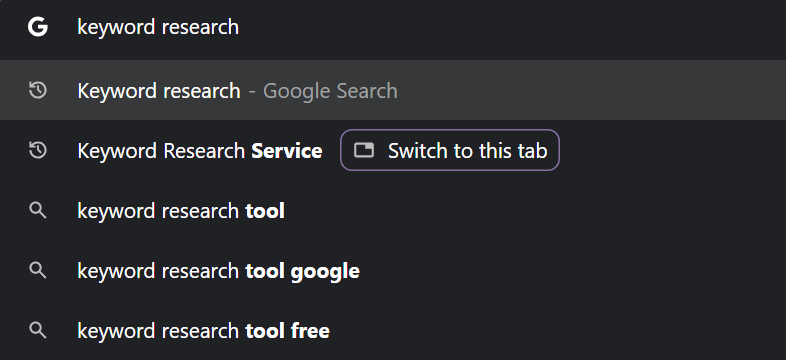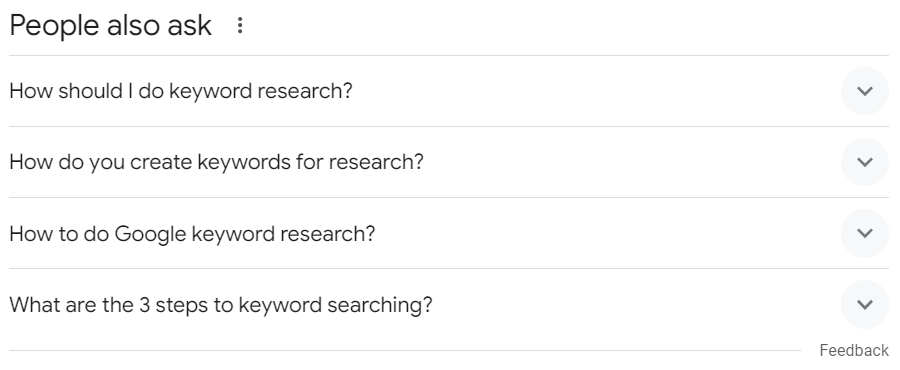Keyword research is something which is going to completely change your SEO process. If you do them properly , one third of the job is done. But most SEO professionals just focus on search volume or keyword difficulty (KD) to choose the keyword for their business. That’s one of the old versions that needs an update.
Keyword research is really an art of understanding the intent, the critical aspect of the query, and how it’s going to contribute to business.
Yes, of course Search Volume and Keyword Difficulty are some of the metrics we need to look at before choosing a keyword But, It’s not the only metrics.
How to do keyword research? I’m are solving this million dollar question in our article with couple of method we use to identify the gem in every niche
What is the first thing you should do before you start doing keyword research?
First, know that the keyword is a point that is going to connect you with your audience. So before doing keyword research,first know who your targeted audience.
Find some factors that guide your audience. It could be Age of your targeted audience, place where you are going to rank, How this keyword benefits your business, etc.
If you keep this in mind, you won’t go off your path in SEO. Every keyword that you choose will align with your end goal.
How to do Keywords Research for Your SEO Strategy
I always follow a strong SEO strategy that was prepared Long ago, which means the Site architecture, where we put up plenty of keywords that connect with others.
In that architecture, we planned our Whole website From top to bottom. This is how keyword research help your SEO strategy.
Lets see step by step process of Keyword Research.
Step 1: Make a list of important, relevant topics based on what you know about your business.
Most of you might have guessed it from the topic itself. Also, let’s dive deep into it.
If you are working on a project or running a business, you guys will at least have some moderate knowledge about it.
LLet’sassume You have an SEO company and are planning to write content for your website.
Just count your finger what are the things you know in SEO?
On Page SEO
OFF Page SEO
Technical SEO
Local SEO
Content Generation
Now you already have five Topics in your hands without any tools, research, or competitor research.
Step 2: Fill in those topic buckets with keywords.
Now consider those topics as your priority Keywords, and Find terms that connect those main topics.
For example, Take technical SEO as your main topic. Think of the subtopics that fall under technical SEO. You may get topics like core web vitals. Redirects, coverage issue, website seed optimisation, etc.
Now you have almost filled each bucket with plenty of subtopics.
Step 3: Understand how intent Affects Keyword Research and Analyze Accordingly.
As we discussed before, volume and KD will not be the only factors in deciding keywords. Intent is one of the main factors.
What is the intent of the keyword?
Think about how you are here on this page. You might have searched for things like how to do keyword research or keyword research in google, bing or any other search engines and ended up here.
I want to insist my reader about keyword research so I choose this informative keyword. If I wanted to provide a service to you guys means I would go for keyword research services instead of keyword research.
This is how intent change the whole perspective , think before selecting the keyword.
Step 4: Research related search terms.
Once you got your intent ,It could be commercial or information or any others. Search for the terms related to that.
If you able to selected the keywords related to your main topic as well as with correct intent. Then the results is not that far.
Split your keywords by intent based and start writing content on it.
Step 5: Use keyword research tools to your advantage.
Now lets come to the volume and KD. Now we have many keywords in our hands.
To prioritise those keywords, use such keyword research tools to find their volume and difficulty. Prioritize with high volume low difficulty to low volume high difficulty.
How do I do keyword research on Google?
If you have no tools to find the keywords, don’t worry; we have Google to find our relevant keywords.
Basically, Long tail keywords are what every SEO person will look for. Because there is some advantage to Longtail keywords.
We can find those long tail keywords on Google itself. Let see.
Auto suggestion
Take the keyword Technical SEO. type it in the Search bar, but don’t search. Google provide you wit the suggestion.
Like wise, you can use any keyword to find its long tail.

People also ask
It’s another simple way to find some long tail keywords on Google.
Now, same as before, take a keyword for technical SEO services and search it in Google.
You can see the result as people also ask. that what the result provides by google as a related search to the topic technical seo

Useful Keyword Tools
Have a look at the tools that are helpful for keyword searches. There are also free pricing tools. Each known for their specific features.
You can use it according to your convenience.
Semrush Keyword Tools
Semrush is the premium tool where you can see some exciting features like keyword overview and keyword magic tools, particularly for keyword research.
It helps to analyse competitors as well, and the filter in this tool makes our process even easier. It is better to know how to use the tool to do proper keyword research.
Google Search Console
It is tool provided by Google to track the data on our website’s performance. It is well known for its data collection.
I strongly suggest you learn how to do keyword research in GSC. Because only 3 out of 10 are using it for keyword research. Most people don’t know that we can do keyword research here.
Google Keyword Planner
Learning about keyword research in Google keyword planner would be useful. It’s also the tool provided by Google for ad keyword research.
But we can use this for SEO purposes as well; it will show you the volume range of the keyword over the years.
Google Trends
When ever we pick the keyword we have to make sure that the keyword would give us traffic in future.
We can use Google trends which predicts the trend of the keywords using previous years data. So also use google trends to do keyword research.
Conclusion
Strength you basics in keyword research, follow the steps mentioned above. Know your audience and plan which keywords will reach you to them.
Explore tools and techniques , learn how to use them. Then you will biome a pro in keyword research.

Pingback: What is a good search volume for a keyword - Find the Right